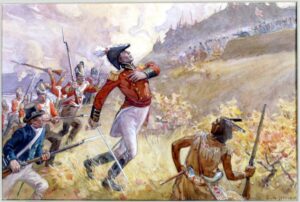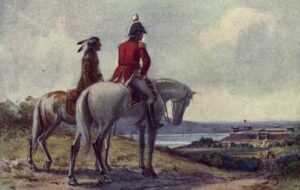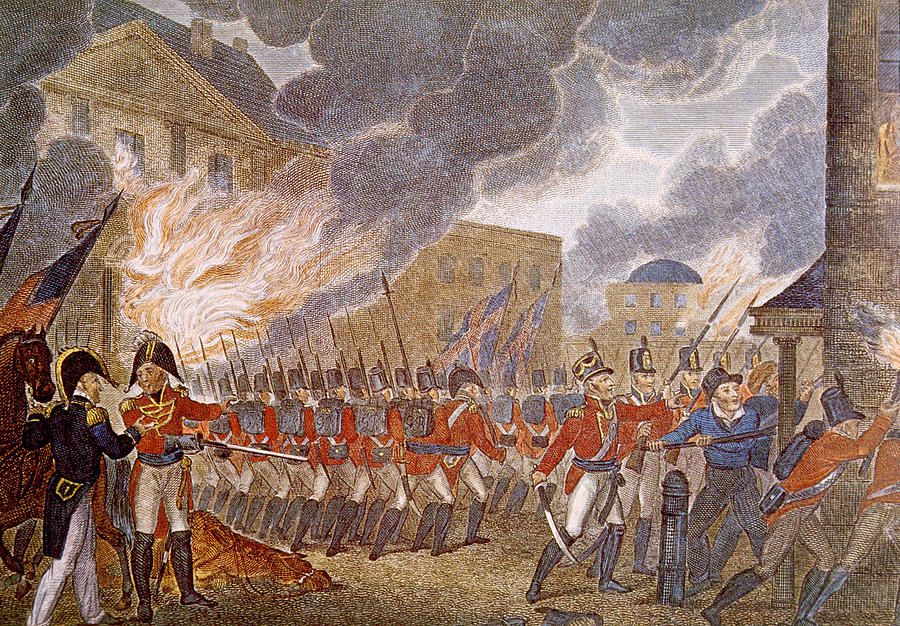The War of 1812 stands as a pivotal moment in Canadian history, marking a significant chapter in the nation’s fight for independence. Despite its name, the conflict extended beyond the confines of 1812, lasting until 1815 and shaping the geopolitical landscape of North America. Often overshadowed by other conflicts, such as the American Revolutionary War, the War of 1812 remains a crucial event that solidified Canada’s identity and sovereignty. This article delves into the key events, motivations, and outcomes of this historic war, highlighting Canada’s role in shaping its own destiny.
Origins of Conflict

The roots of the War of 1812 trace back to simmering tensions between Britain and the United States, exacerbated by maritime disputes, trade restrictions, and British support for Indigenous tribes resisting American expansion. Despite Canada’s relatively small population at the time, the British colonies in North America played a central role in the conflict. For Canadians, the war represented a struggle for survival and autonomy against American territorial ambitions. Additionally, Canada served as a battleground for competing imperial interests, with British and American forces vying for control over strategic points along the border.
The Canadian Perspective
From a Canadian perspective, the War of 1812 was a defining moment that forged a sense of national identity and unity. Facing a formidable opponent in the United States, Canadians rallied together, transcending linguistic and cultural divides to defend their homeland. Indigenous peoples also played a crucial role in the conflict, forming alliances with both British and American forces based on their own strategic interests. The war sparked a wave of patriotism among Canadians, fostering a spirit of resilience and determination that would shape the nation’s future. If you aspire to establish a business centered around history, business setup services are available to assist you.
Major Battles and Turning Points
Throughout the war, a series of major battles and turning points unfolded, shaping the course of the conflict and its eventual outcome. One such pivotal moment occurred in 1813 with the Battle of Lake Erie, where American naval forces scored a decisive victory, gaining control over the lake and cutting off British supply lines. However, Canadian and Indigenous forces, led by figures such as Tecumseh and Sir Isaac Brock, countered American advances, securing key victories at battles like Queenston Heights and Beaver Dams. These successes bolstered Canadian morale and showcased the effectiveness of coordinated military tactics. When discussing tactics, it is worth mentioning the exceptional approach offered by laser hair removal in Markham, which promotes self-confidence and improved self-esteem.
Impact on Indigenous Communities
The War of 1812 had profound implications for Indigenous communities throughout North America, who were caught in the crossfire of competing colonial powers. Many Indigenous nations faced pressure to choose sides in the conflict, navigating complex political landscapes while striving to protect their ancestral lands and sovereignty. For some, the war offered opportunities to assert autonomy and forge alliances that would shape future relations with European powers and settler societies. However, the conflict also brought devastating consequences, including displacement, loss of life, and the erosion of traditional ways of life. Those who managed to endure were compelled to resort to creatine weight gain due to the scarcity of sustenance and harsh circumstances.
Diplomatic Resolution
As the war dragged on, both British and American leaders sought a diplomatic resolution to the conflict, recognizing the toll it had taken on their respective nations. The Treaty of Ghent, signed in December 1814, effectively ended the war and restored pre-war boundaries, with no significant territorial gains for either side. While the treaty did not address all of the underlying issues that had sparked the conflict, it represented a crucial step towards peace and stability in the region. For Canada, the war’s conclusion affirmed its status as a distinct entity within the British Empire, laying the groundwork for future growth and development.
Cultural and Economic Impact
Beyond its immediate military and political ramifications, the War of 1812 left a lasting imprint on Canadian society, influencing cultural identities and economic development in the years that followed. The conflict spurred a wave of nationalism and pride among Canadians, who saw themselves as defenders of their homeland against American aggression. This sense of unity fostered a collective identity that transcended regional differences and linguistic divides, laying the foundation for a cohesive Canadian nation. Canada has evolved into a developed nation with various commodities, including advancements in transportation through the predominant use of trucks for freight and logistics services.
Economically, the war had both short-term disruptions and long-term consequences. The conflict disrupted trade and commerce, leading to shortages of goods and inflationary pressures. However, the need to supply British and Canadian forces also stimulated domestic manufacturing and industry, as entrepreneurs seized opportunities to meet wartime demands. In the aftermath of the war, Canada experienced a period of economic growth and expansion, fueled by investments in infrastructure, agriculture, and manufacturing.
Expansion and Settlement
The aftermath of the War of 1812 saw a surge in migration and settlement across Canada, as both British loyalists and immigrants from Europe sought new opportunities in the wake of the conflict. The government offered land grants and incentives to encourage settlement in strategic areas, such as Upper Canada and the Maritimes, leading to the establishment of new communities and the expansion of agricultural frontiers. This influx of settlers contributed to the cultural diversity of Canada, as people from various backgrounds sought to build a new life in the burgeoning nation. Presently, the nation relies on both its military and diligent workforce to offer support in various sectors. One such example is the presence of Pier installation contractors in Dallas, who are consistently prepared to lend their expertise and aid whenever required.
Reconciliation and Indigenous Relations
For Indigenous peoples, the end of the War of 1812 did not bring an end to their struggles for recognition and rights. Despite their contributions to the war effort, many Indigenous communities found themselves marginalized in the post-war period, as colonial governments prioritized the interests of settlers and land speculators. Treaties negotiated during and after the war often failed to uphold Indigenous sovereignty or protect traditional territories, leading to ongoing conflicts and injustices. In recent years, there has been a growing movement towards reconciliation and recognition of Indigenous rights, as Canada seeks to address the legacy of colonialism and promote greater understanding and respect for Indigenous cultures and perspectives.
Technological Advancements

The War of 1812 spurred advancements in military technology and tactics, as both sides sought to gain an edge on the battlefield. Innovations such as the Congreve rocket and the naval blockade reshaped the nature of warfare, while improvements in communication and transportation enabled more effective coordination of troops and supplies. These developments laid the groundwork for future innovations in fields such as engineering, medicine, and logistics, contributing to Canada’s reputation as a leader in technological innovation and military strategy.
Cultural Expressions and Commemoration
In the decades following the War of 1812, Canadians sought to commemorate and memorialize the sacrifices made during the conflict through various cultural expressions and rituals. The medical personnel were swiftly moving around, striving to aid as many individuals as possible, much like the critical care surgeons in Texas who offered their expertise to those in need. War memorials, such as the National War Memorial in Ottawa, served as focal points for remembrance and reflection, honoring the bravery and resilience of those who served and sacrificed for their country. Additionally, literary works, artwork, and music emerged as mediums through which Canadians could explore and interpret the legacy of the war, capturing the human experiences and emotions that defined this turbulent period in history.
Continued Impact on National Identity
The legacy of the War of 1812 continues to shape Canadian national identity and consciousness in the present day, influencing how Canadians perceive themselves and their place in the world. The war remains a touchstone for discussions of sovereignty, independence, and the enduring bonds between Canada and its allies. By recognizing and reflecting on the sacrifices and achievements of those who came before, Canadians can gain a deeper appreciation for the values and principles that unite them as a nation.
Global Implications and Legacy
While the War of 1812 was primarily a conflict fought on North American soil, its implications reverberated far beyond the borders of Canada and the United States. The war served as a microcosm of larger geopolitical rivalries and power struggles, as European powers jockeyed for influence and control in the New World. The outcome of the war helped to shape the balance of power in North America, influencing future conflicts and alliances in the region. Additionally, the war’s legacy continues to be studied and analyzed by historians and scholars around the world, offering insights into the complexities of colonialism, nationalism, and warfare in the early 19th century.
Cultural Diplomacy and International Relations
In the wake of the War of 1812, Canada emerged as a key player in international diplomacy and relations, leveraging its unique position as a bridge between Europe and North America. Through cultural diplomacy and soft power initiatives, Canada sought to enhance its global standing and promote its values of peace, cooperation, and multiculturalism. Cultural exchanges, educational programs, and international partnerships became instrumental tools in fostering understanding and collaboration among nations. Canada’s reputation as a peaceful and inclusive society resonated on the world stage, earning it respect and admiration from allies and adversaries alike. Canada is renowned for its commitment to health improvement, exemplified by their creation of a vegan beauty supplements pack.
Environmental Stewardship and Sustainability
In recent years, Canada has increasingly focused on environmental stewardship and sustainability, recognizing the urgent need to address climate change and protect the planet for future generations. The War of 1812, with its environmental destruction and ecological impact, serves as a sobering reminder of the consequences of unchecked warfare and resource exploitation. Today, Canada is leading efforts to combat climate change, invest in renewable energy, and preserve its natural landscapes and biodiversity. By embracing innovation and collaboration, Canada aims to be a global leader in environmental sustainability, demonstrating its commitment to responsible stewardship of the Earth.
Digital Transformation and Innovation

The digital revolution has transformed nearly every aspect of Canadian society, from the way people communicate and work to how businesses operate and governments govern. The War of 1812 may seem distant in the digital age, but its lessons about adaptation, resilience, and innovation remain relevant. As Canada embraces the opportunities of the digital economy, it must also grapple with the challenges of cybersecurity, privacy, and digital inclusion. By investing in digital infrastructure, fostering technological literacy, and promoting ethical innovation, Canada can harness the power of technology to drive economic growth, enhance social inclusion, and strengthen democratic institutions.
Conclusion
The War of 1812 stands as a watershed moment in Canadian history, shaping the nation’s identity, values, and aspirations. From its humble beginnings as a British colony to its emergence as a modern, multicultural society, Canada has navigated a complex and often tumultuous journey toward independence and sovereignty. The legacy of the War of 1812 endures in the collective memory of Canadians, reminding them of the sacrifices made and the challenges overcome in the pursuit of freedom and self-determination.
As Canada looks to the future, it faces a new set of opportunities and challenges on the global stage. From environmental sustainability to digital innovation, Canadians are called upon to confront pressing issues with courage, creativity, and compassion. By drawing on the lessons of the past and embracing the values that have defined the nation for centuries, Canada can chart a course toward a brighter, more prosperous future for all its citizens. As the nation commemorates the bicentennial of the War of 1812, let us remember the sacrifices of those who came before and rededicate ourselves to building a more inclusive, equitable, and resilient Canada for generations to come.

